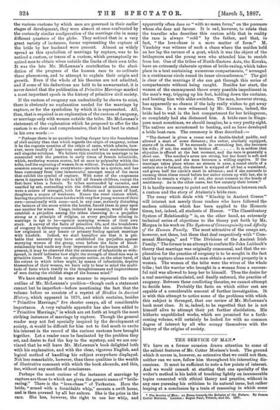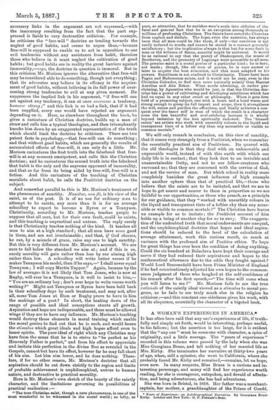THE SERVICE OF MAN"
Ws have on a former occasion drawn attention to some of the salient features of Mr. Cotter Morison's book. The ground which it covers is, however, so extensive that we could not then, neither can we now, follow him throughout his interesting dis- cussions. It must be sufficient to note a few points of interest. And we would remark at starting that one specialty of the writer's method is his habit of touching lightly on innumerable topics connected with ethical theory and practice, without in any case pursuing his criticism to its natural issue, but rather leaping at a conclusion by a train of reasoning in which some • no Service of Man an Essay towards the Religion of the Future. By James Cotter Morison. London Megan rani, Trenob, and 0o. 1887.
necessary links in the argument are not expressed,—with the inaccuracy resulting from the fact that the part sup- pressed is liable to very destructive criticism. For example, be criticises the "free-will" doctrine as tending towards the neglect of good habits, and seems to argue thus,—because
free-will is supposed to enable us to act in opposition to our evil tendencies without any assistance from habit, therefore those who believe in it must neglect the cultivation of good habits; but good habits are in reality the great barriers against immorality,—ergo, the doctrine in question is immoral. But in this criticism Mr. Morison ignores the alternative that free-will may be considered able to do something, though not everything ; that its advocates may believe in its efficacy in the acquire- ment of good habits, without believing in its full power of over- coming strong tendencies to evil at any given moment. He suppresses the implied link in his argument, "if free-will can act against any tendency, it can at once overcome a tendency, however strong ;" and this link is so bad a link, that if it had been supplied, every one would have rejected an argument depending on it. Here, as elsewhere throughout the book, he gives a caricature of Christian doctrine, builds up a man of straw and calls him a typical theologian, and then triumphantly knocks him down by an exaggerated representation of the truth which should limit the doctrine he criticises. There are two patent facts in psychology,—that free-will can do something ; and that without good habits, which are generally the results of accumulated efforts of free-will, it can only do a little. Mr. Morison caricatures the first truth into the falsehood that free- will is at any moment omnipotent, and calls this the Christian doctrine; and he caricatures the second truth into the falsehood that habit is the only and the supreme opponent of immorality, and that so far from its being aided by free-will, free-will is a fiction. And this caricature of the teaching of Christian moralists about habit, he calls the Positivist doctrine on the subject.
And somewhat parallel to this is Mr. Morison's treatment of the phenomena of sanctity. Nasoitur, non fit, is his view of the saint, as of the poet. It is of no use for ordinary men to attempt to be saints, any more than it is for an average schoolboy to expect to become a Byron or a Tennyson. Christianity, according to Mr. Morison, teaches people to suppose that all men, but for their own fault, could be saints, and this teaching is unpractical and untrue. The reply surely is that Christianity teaches nothing of the kind. It teaches all men to aim at a high standard ; that all men have some good in them, and are not irreclaimable ; and that, if God chooses, he can, by a miracle of grace, raise any one to high sanctity. But this is very different from Mr. Morison's account. We are sure to fall below the standard we aim at; and if this is so, surely morality will gain rather than lose by our aiming high rather than low. A schoolboy will write better verses if he makes Tennyson his model, than if he says,—' I shall never equal Tennyson ; I will copy Martin Tapper." Again, because by the law of averages it is not likely that Tom Jones, who is now at Rugby, will ever be a Tennyson, is it well to insist to him,— " Yon are an ordinary boy ; don't ever hope to write verses worth writing ?" Might not Tennyson or Byron have been held back in their schoolboy days by such treatment, and may not, after all, some Tom Jones at Eton or Rugby prove to have in him the makings of a poet? In short, the beating down of the range of possible and ideal conceptions stunts all growth. Aspiration and hope are indispensable, and these must be allowed wings if they are to have any influence. Mr. Morison's teaching would destroy those elements in moral training which enable the moral genius to find out that he is such, and would lessen the stimulus which great ideals and high hopes afford even to lesser spirits. The pure ideal of right which any Christian may have from the sense that he is to strive to "be perfect as his Heavenly Father is perfect," and from his effort to appreciate and imitate this perfection in the divine Son as revealed in the Gospels, cannot but have its effect, however far he may fall short of his aim. Let him aim lower, and he does nothing. There- fore, if for no other reason, Mr. Morison's doctrine that all aspiration should be cut down strictly to the region and limits of probable achievement is unphilosophioal, untrue to human nature, and destructive to practical morality.
Here is Mr. Morison's own sketch of the beauty of the saintly character, and the limitations governing its possibilities of practical realisation:— -
" The true Christian saint, though a rare phenomenon, is one of the most wonderful to be witnessed in the moral world; so lofty, so pure, so attractive, that he ravishes men's souls into oblivion of the fatal and general fact that be is an exception among thousands or millions of professing Christians. The Saints have saved the Churches from neglect and disdain. The hope, even the assertion, has always been that all men could be like them, if only—the condition is not easily reduced to words, and cannot be stated in a manner generally satisfactory; bat the implication always is that but for some fault in man or the wiliness of Satan, sanctity might be universal. It would be as rational to say that the poetry of Shakespeare, the music of Beethoven, and the geometry of Lagrange were accessible to all men. The genuine saint is a moral genius of a particular kind ; he is born, not made; though, like all men of genius, be is sure sooner or later to acquire the best education, and that most adapted to his powers. Saintliness is not confined to Chriatianity. There have been Pagan and Mahometan saints, and it would not be easy, even in the Christian Calendar, to find men more naturally saintly than Marcus Aurelius and Abu Baker. What needs admitting, or rather pro- claiming, by Agnostics who would be just, is that the Christian doc- trine has a power of cultivating and developing saintliness which has had no equal in any other creed or philosophy. When it gets firm hold of a promising subject, one with a heart and a bead warm and strong enough to grasp its full import and scope, then it strengthens the will, raises and purifies the affections, and finally achieves a con- quest over the baser self in man of which the result is a character none the less beautiful and soul-subduing because it is wholly beyond imitation by the less spiritually endowed. The ' blessed saints' are artists who work with unearthly colours in the liquid and transparent tints of a loftier sky than any accessible or visible to common mortals."
We will only remark in conclusion, on this view of sanctity, that it comes very strangely irons a Positivist, when we remember the essentially practical aim of Positivism. Its quarrel with the old theologies is that they deal with an unknowable and unprovable world, instead of with this earth with which our daily life is in contact ; that they look first to an invisible and unascertainable Deity, and not to our fellow-creatures wbo surround us ; that they are concerned with the service of God, and not the service of man. But which school in reality more completely banishes the great influence of high example into another sphere than that of practical life,—those who believe that the saints are to be imitated, and that we are to hope to get nearer and nearer to them in proportion as we are faithful to our opportunities, or those who preach, as a principle for our guidance, that they " worked with unearthly colours in the liquid and transparent tints of a loftier sky than any acces- sible or visible to common mortals ?" The Christian hero leaves an example for us to imitate ; the Positivist account of him holds up a being of another clay for us to envy. The exaggera- tion of the undoubted truth that moral endowments are unequal, and the unphiloeopbical doctrine that hopes and ideal aspira- tions should be reduced to the level of the calculation of average attainment, work this curious result, so much at variance with the professed aim of Positive ethics. To hope for great things has ever been the condition of doing anything. Could the six hundred at Balaclava have kept their courage and nerve if they had reduced their aspirations and hopes to the mathematical allowance due to the odds they fought against Would Lord Beaconsfield have been Prime Minister of England if he had conscientiously adjusted his own hopes to the common. sense judgment of those who laughed at the self-confidence of his remark after his first speech,—" The time will come when you will listen to me ?" Mr. Morison fails to see the true rationale of the saintly ideal viewed as a stimulus to moral pro- gress, as he fails to see truly much else in the religion he criticises and this constant one-sidedness gives his work, with all its eloquence, essentially the character of a bigoted book.



































 Previous page
Previous page